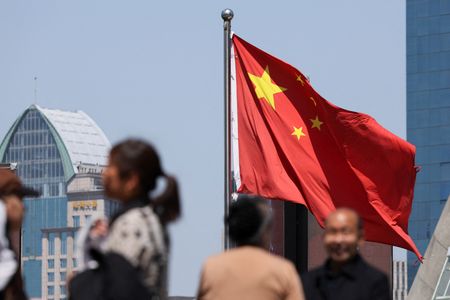BEIJING (Reuters) -China’s fiscal revenue dipped 0.3% in the first six months from a year earlier, the finance ministry said on Friday, maintaining the rate of decline seen between January and May.
Fiscal expenditure increased 3.4% year-on-year in the January-June period, slower than the 4.2% rise in the first five months, ministry official Tang Longsheng told a press conference.
Fiscal revenue in the first six months totalled 11.56 trillion yuan ($1.61 trillion) while expenditure came at 14.13 trillion yuan, Tang said.
That resulted in a fiscal deficit of 2.57 trillion yuan for the first six months, according to the data. The figure is subject to revision towards the year-end.
The government has set a full-year budget deficit target of 5.66 trillion yuan, or 4% of gross domestic product.
“Next, the finance ministry will continue to implement a more proactive fiscal policy, accelerate budget execution, improve the efficiency of fund utilisation, and promote a sustained economic recovery,” said Li Dawei, a second finance ministry official.
Tax revenue fell 1.2% in January-June from a year earlier and non-tax revenue grew 3.7%.
China has allocated 69 billion yuan in special bonds for the consumer good trade-ins programme, the third batch this year, another ministry official Wu Gai said.
The government had previously allocated 162 billion yuan in special bonds – out of the annual quota of 300 billion yuan, to support the trade-in scheme.
The remaining funds will be issued in October, finance ministry officials said.
Local governments issued 2.16 trillion yuan in new local government special bonds in the first six months, up 45% year-on-year, they said.
The full-year quota for such bond issuance is set at 4.4 trillion yuan.
Friday’s data also showed revenue from land sales by China’s local governments slid 6.5% in the first six months, following a 11.9% drop in January-May.
China’s economy slowed less than expected in the second quarter despite U.S. tariffs, though analysts say that weak domestic demand and rising global trade risks may drive policymakers to introduce additional stimulus measures.
($1 = 7.1656 Chinese yuan)
(Reporting by Kevin Yao and Beijing Newsroom; Editing by Jacqueline Wong and Tomasz Janowski)









